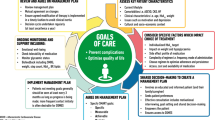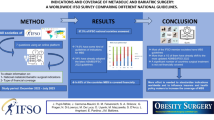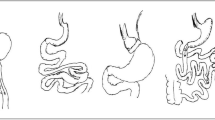Abstract
Background
Roux-en-Y gastric bypass (RYGB) is a recommended treatment for type 2 diabetes mellitus (T2DM) in patients with obesity, with superiority over medical therapy. While diabetes remission is achieved initially in 60–90% of patients following surgery, many may experience relapse of diabetes on the long-term. Data on long-term follow-up of bariatric surgery is scarce. We report this 12-year follow-up study of glycaemic control following RYGB.
Methods
Two hundred seventeen patients with obesity (109 diabetic, 108 matched nondiabetic) who underwent RYGB between 2000 and 2008 were identified. Data was recorded prospectively for these patients at baseline and 2 years postoperatively. The long-term data was obtained via direct contact with the patients cross-checked with our hospital/national patients’ electronic databases.
Results
The follow-up rate was 88% (initial age 44 ± 9 years, female 79%). The mean (± SD) percentage total weight loss was 28% (± 15%) and 27% (± 17%) at 2 years and 12 years, respectively. Diabetes remission rate was 69% at 2 years, but decreased to 36% at 12 years following surgery. The 12-year incidence of new-onset T2DM in the control group was 4.3%. On univariate analysis, age, preoperative duration of diabetes and use of insulin were associated with less chance of diabetes remission at long-term (p value 0.06, 0.01 and 0.03, respectively). However, on multivariate regression analysis, only the duration of diabetes preoperatively remained significant (p = 0.025).
Conclusion
This study shows a high relapse of diabetes 12-year post-RYGB despite the durability of weight loss. This affects preoperative counselling and indicates a need for a longer follow-up to detect relapse.

Similar content being viewed by others
References
Ford ES, Williamson DF, Liu S. Weight change and diabetes incidence: findings from a national cohort of US adults. Am J Epidemiol. 1997;146(3):214–22.
Mokdad AH, Bowman BA, Ford ES, et al. The continuing epidemics of obesity and diabetes in the United States. JAMA. 2001;286(10):1195–200.
National Institute for Health & Clinical Excellence Guideline (2014). Obesity: identification, assessment and management [CG 189]. https://www.nice.org.uk/guidance/cg189. In.
Dixon JB, Zimmet P, Alberti KG, et al. Prevention IDFToEa. Bariatric surgery: an IDF statement for obese type 2 diabetes. Surg Obes Relat Dis. 2011;7(4):433–47.
Basevi V, Di Mario S, Morciano C, Nonino F, Magrini N. Comment on: American Diabetes Association. Standards of medical care in diabetes--2011. Diabetes Care 2011;34(Suppl. 1):S11-S61. Diabetes Care. 2011;34(5):e53; author reply e54.
Pories WJ, Swanson MS, MacDonald KG, et al. Who would have thought it? An operation proves to be the most effective therapy for adult-onset diabetes mellitus. Ann Surg. 1995;222(3):339–50. discussion 350-332
Whitson BA, Leslie DB, Kellogg TA, et al. Entero-endocrine changes after gastric bypass in diabetic and nondiabetic patients: a preliminary study. J Surg Res. 2007;141(1):31–9.
Schauer PR, Kashyap SR, Wolski K, et al. Bariatric surgery versus intensive medical therapy in obese patients with diabetes. N Engl J Med. 2012;366(17):1567–76.
Mingrone G, Panunzi S, De Gaetano A, et al. Bariatric surgery versus conventional medical therapy for type 2 diabetes. N Engl J Med. 2012;366(17):1577–85.
Buchwald H, Estok R, Fahrbach K, et al. Weight and type 2 diabetes after bariatric surgery: systematic review and meta-analysis. Am J Med. 2009;122(3):248–256.e245.
Arterburn DE, Bogart A, Sherwood NE, et al. A multisite study of long-term remission and relapse of type 2 diabetes mellitus following gastric bypass. Obes Surg. 2013;23(1):93–102.
Schauer PR, Bhatt DL, Kirwan JP, et al. Bariatric surgery versus intensive medical therapy for diabetes - 5-year outcomes. N Engl J Med. 2017;376(7):641–51.
Mingrone G, Panunzi S, De Gaetano A, et al. Bariatric-metabolic surgery versus conventional medical treatment in obese patients with type 2 diabetes: 5 year follow-up of an open-label, single-centre, randomised controlled trial. Lancet. 2015;386(9997):964–73.
Adams TD, Davidson LE, Litwin SE, et al. Weight and metabolic outcomes 12 years after gastric bypass. N Engl J Med. 2017;377(12):1143–55.
Sjöström L, Lindroos AK, Peltonen M, et al. Lifestyle, diabetes, and cardiovascular risk factors 10 years after bariatric surgery. N Engl J Med. 2004;351(26):2683–93.
Hall TC, Pellen MG, Sedman PC, et al. Preoperative factors predicting remission of type 2 diabetes mellitus after Roux-en-Y gastric bypass surgery for obesity. Obes Surg. 2010;20(9):1245–50.
Buse JB, Caprio S, Cefalu WT, et al. How do we define cure of diabetes? Diabetes Care. 2009;32(11):2133–5.
Gloy VL, Briel M, Bhatt DL, et al. Bariatric surgery versus non-surgical treatment for obesity: a systematic review and meta-analysis of randomised controlled trials. BMJ. 2013;347:f5934.
Hofsø D, Fatima F, Borgeraas H, et al. Gastric bypass versus sleeve gastrectomy in patients with type 2 diabetes (Oseberg): a single-centre, triple-blind, randomised controlled trial. Lancet Diabetes Endocrinol. 2019;7(12):912–24.
Ikramuddin S, Korner J, Lee WJ, et al. Roux-en-Y gastric bypass vs intensive medical management for the control of type 2 diabetes, hypertension, and hyperlipidemia: the Diabetes Surgery Study randomized clinical trial. JAMA. 2013;309(21):2240–9.
Pournaras DJ, Aasheim ET, Søvik TT, et al. Effect of the definition of type II diabetes remission in the evaluation of bariatric surgery for metabolic disorders. Br J Surg. 2012;99(1):100–3.
Rubino F, Moo TA, Rosen DJ, et al. Diabetes surgery: a new approach to an old disease. Diabetes Care. 2009;32(Suppl 2):S368–72.
Thaler JP, Cummings DE. Minireview: hormonal and metabolic mechanisms of diabetes remission after gastrointestinal surgery. Endocrinology. 2009;150(6):2518–25.
Robert M, Ferrand-Gaillard C, Disse E, et al. Predictive factors of type 2 diabetes remission 1 year after bariatric surgery: impact of surgical techniques. Obes Surg. 2013;23(6):770–5.
Brethauer SA, Aminian A, Romero-Talamás H, et al. Can diabetes be surgically cured? Long-term metabolic effects of bariatric surgery in obese patients with type 2 diabetes mellitus. Ann Surg. 2013;258(4):628–36. discussion 636-627
Dixon JB, Chuang LM, Chong K, et al. Predicting the glycemic response to gastric bypass surgery in patients with type 2 diabetes. Diabetes Care. 2013;36(1):20–6.
Pournaras DJ, Osborne A, Hawkins SC, et al. Remission of type 2 diabetes after gastric bypass and banding: mechanisms and 2 year outcomes. Ann Surg. 2010;252(6):966–71.
Rubino F, Puhl RM, Cummings DE, et al. Joint international consensus statement for ending stigma of obesity. Nat Med. 2020;26(4):485–97.
Shah A, Laferrère B. Diabetes after bariatric surgery. Can J Diabetes. 2017;41(4):401–6.
Author information
Authors and Affiliations
Corresponding author
Ethics declarations
Conflict of Interest
All authors (Ahmed Mohammed Elshaer, Muhammad Qutayba Almerie, Michael Pellen, Prashant Jain) have no conflict of interest to declare. Results were presented at BOMSS congress 2020 (poster) and accepted at IFSO-European chapter congress 2020 (oral).
Ethics and Consent Information
All work involving the participants in this study was in accordance with the ethical standards of our institution and with the 1964 Helsinki declaration and its later amendments. Informed consent was obtained from all individual participants included in the study to use their data in our research work.
Additional information
Publisher’s Note
Springer Nature remains neutral with regard to jurisdictional claims in published maps and institutional affiliations.
Rights and permissions
About this article
Cite this article
Elshaer, A.M., Almerie, M.Q., Pellen, M. et al. Relapse of Diabetes After Roux-en-Y Gastric Bypass for Patients With Obesity: 12 Years Follow-up Study. OBES SURG 30, 4834–4839 (2020). https://doi.org/10.1007/s11695-020-04782-z
Received:
Revised:
Accepted:
Published:
Issue Date:
DOI: https://doi.org/10.1007/s11695-020-04782-z




